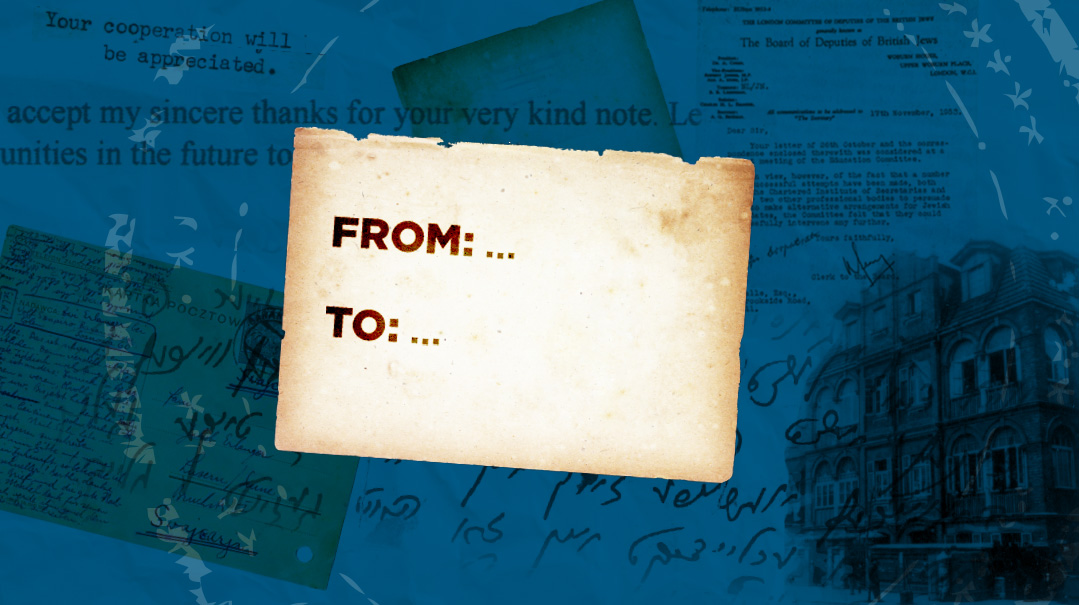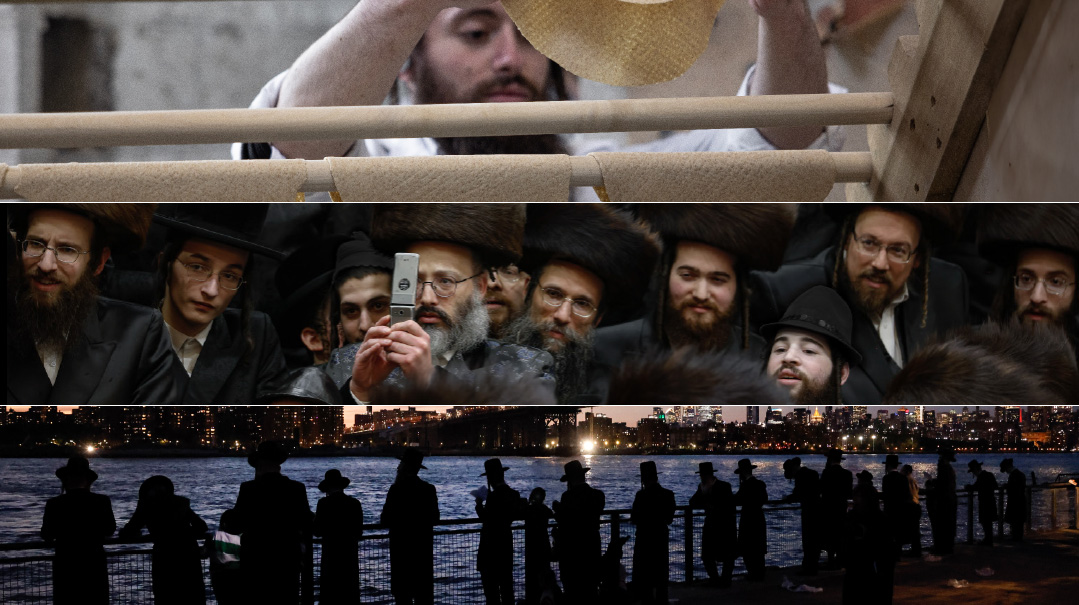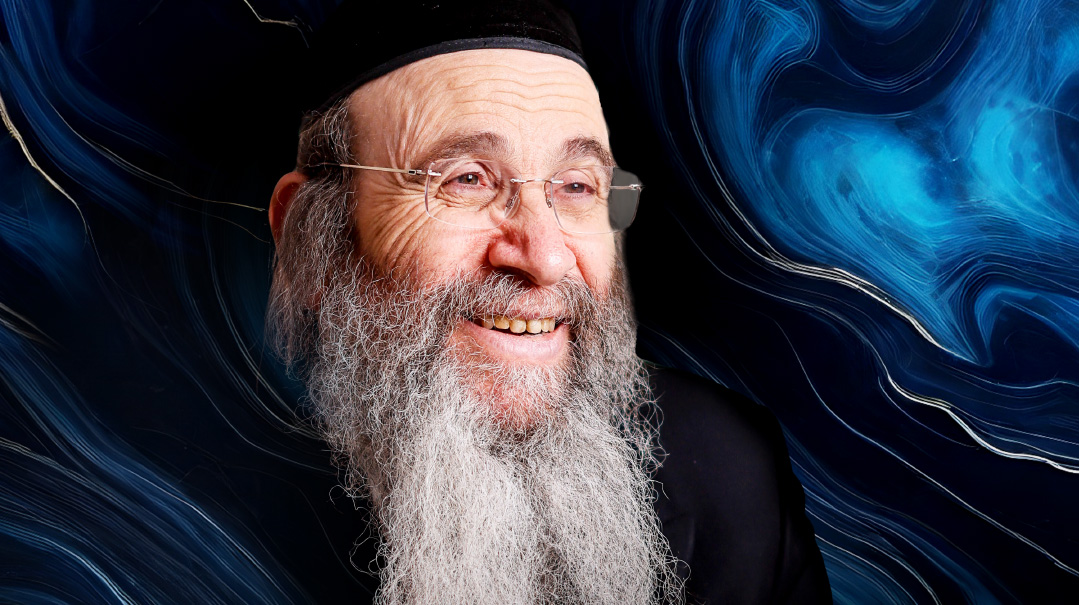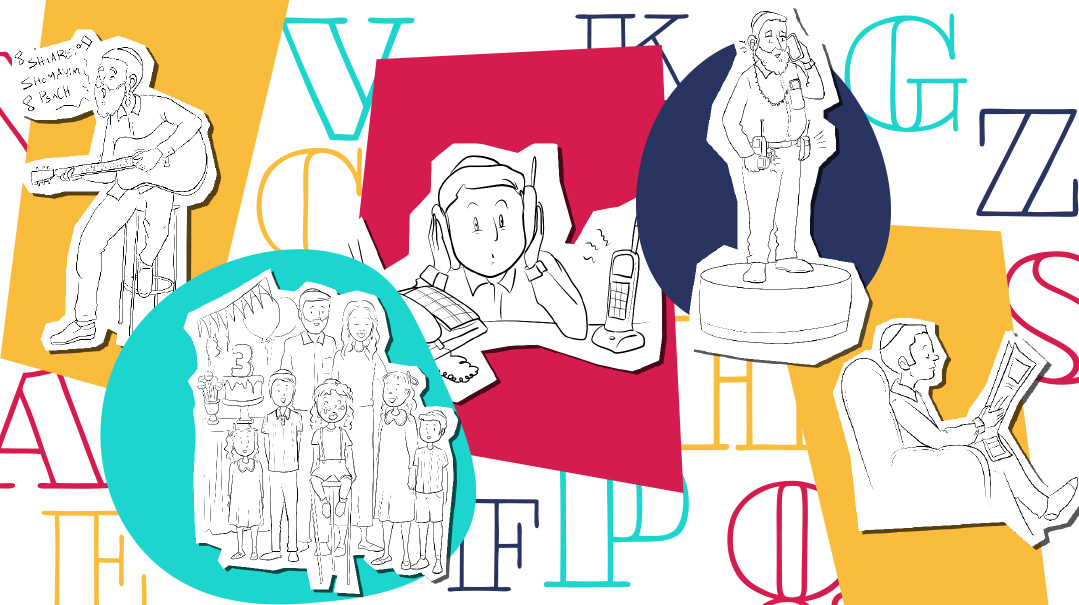Royal Repast
| December 16, 2020He’s catered for the Queen and brought kosher to Dubai, but Arieh Wagner’s greatest pride is serving Torah nobility
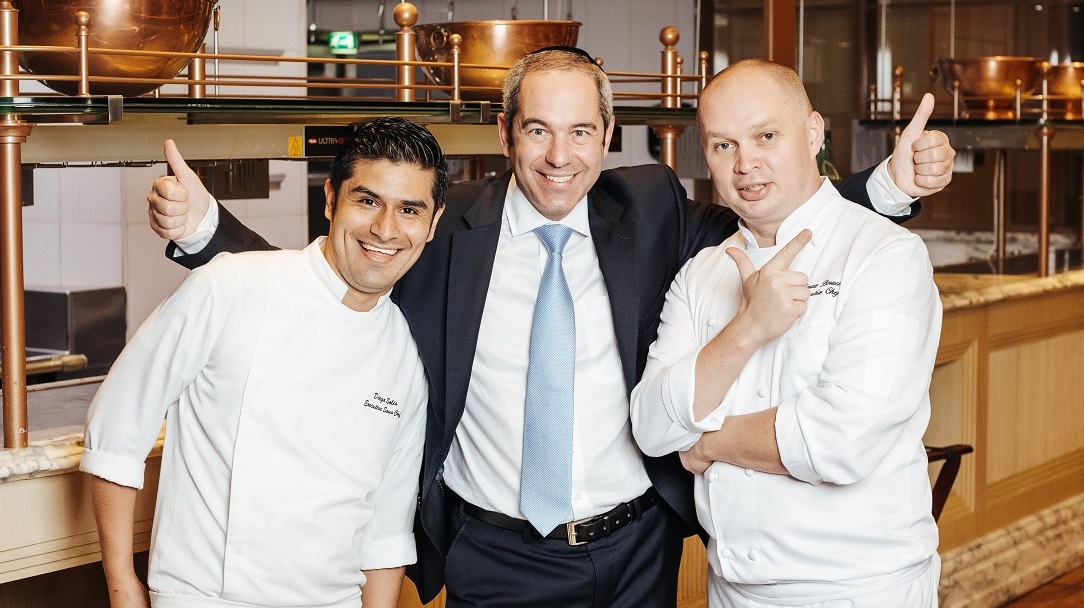
The call couldn’t have come at a better time. With COVID-19 scaling down weddings significantly and erasing social events from the calendar, hotelier and caterer Arieh Wagner of Golders Green, London, found himself without a single job since Purim. Then came the groundbreaking peace deal between the United Arab Emirates and Israel in August, followed by the treaty between Bahrain and Israel a month later.
As soon as the Bahrain deal was announced, Wagner received a call from a former Sheraton Hotel colleague of 20 years ago. “Do you remember me?” the fellow asked, explaining that he is now the manager of the Ritz-Carlton in the Arabic country of Bahrain.
Their conversation continued in person shortly after, with a handshake, er, elbow bump, all the way in Bahrain, an island in the Persian Gulf with a small 150-year-old Jewish community. The manager contracted Wagner to supply double-wrapped kosher meals for the Ritz-Carlton, to serve the expected influx of Jewish tourists.
A friend from London then introduced Wagner to the Habtoors, a wealthy Emirati family that owns a few hotels in the UAE, one of which was suitable for a kosher program. Because COVID-19 is not so rampant in Dubai, it is business as usual there, and the Habtoors wanted to be able to cater to a Jewish crowd. They offered Wagner the job.
“The situation in my industry is so dire that when Dubai came up, I knew I had to do it,” Wagner explains. “You have to reinvent yourself. It took a lot of mental power to travel after being stationed at home for so long, but more so, to travel to an Arabic place that was so different from anywhere I’ve been…. But sometimes you have to go out of your comfort zone.”
And so, after many months of no work, Wagner is back in business. He is hosting a kosher program in the five-star Habtoor Palace, with its marbled atriums, magnificent suites, sparkling pools, and private access to the Palm Jumeirah beach. Wagner is shipping all the food from the UK because, as he says, he doesn’t shecht camels, and he is fielding several inquiries about weddings in Dubai, as well.
His daughter Racheli, a teacher, recently flew to Dubai to scout out program trip ideas and arrange the kids’ club — standard procedure for Wagner’s hotel programs. She wasn’t disappointed: Dubai’s highlights include the world’s tallest building, the Burj Khalifa and its 148th floor observation deck; the Palm Islands, a show-stopping flower garden and water fountain walkway; sand dune Jeeping and desert safaris; the world’s biggest aquarium; and an enormous water park.
Royal Treatment
Before COVID-19 hit, Mr. Wagner ran kosher-hotel summer and winter programs in St. Moritz’s upper-crust Kempinski Hotel in Switzerland, taking a section of the luxury quarters, including allotted allowance of the pool as a mikveh. Year round, he managed the kosher catering at the upscale Sheraton Grand London Park Lane Hotel in London. The prestigious position served as a stepping stone to some dazzling career opportunities; for the past seven years, Arieh has been the kosher caterer of choice for the British royal palace and government.
The contract is subject to a nondisclosure agreement, so he’s limited in what he can share.
“Well, I never met the queen,” Mr. Wagner says, throwing a damp towel on my curiosity.
“Did you never try to finagle your way into an event by disguising yourself as a waiter or butler?” I ask, a mix of awe and horror.
“Nope, that’s why I’m still there. The palace values discretion. If I would overstep in the slightest way, I would fly from there.”
Even without meeting the queen, Wagner has gathered that her servants love working for their employer. “Her Majesty is a true queen in her own home and wants every staff member or visitor to be looked after properly. She’s not at all the remote, aloof employer. The staff, in turn, care for their boss and make sure the palace reflects on her hospitable attitude.”
He shares an example. At the Queen’s Annual Garden Party — attended by at least 500 major VIPS — the royal chef hunted down Chief Rabbi Ephraim Mirvis and his wife from the 2,000 guests present to check if their kosher requirements had been satisfactorily met.
“It’s unbelievable how accommodating and conscious they are of everyone’s needs. They will never merely serve a kosher airline meal, when anyone would be thrilled with that for the privilege of visiting the palace. It has to be an exact replica of the nonkosher cuisine. I’ve been to plenty of hotels where I see unhappy staff. The royal-staff satisfaction stands out,” he says.
I try my luck, unabashed: “If you ever need extra staff or waitresses there, count me in.”
“I have a long list of people like you,” he answers with a chuckle — but he takes no chances. For royal events, Wagner uses his steady staff, who have proven both discreet and geshikt. To kasher the palace kitchen, or any government premises, Wagner hires mashgiach Simcha Hirsch, an experienced and professional product-certifications manager at the Federation of Synagogues. “I can’t afford a mashgiach who will burn the kitchen down,” he says.
Some palace banquets are served — to Wagner’s initial shock — on real silver dinner plates. The bonus is that silver can be kashered, with the caveat that it is unused for 24 hours prior, which the palace accommodates. It’s astonishing, he notes, and indeed a reflection of the queen’s hospitality, that the palace allows the lavish silverware to be reserved and then “dunked in a tub of scalding water.”
On one occasion, before the Mirvises were invited for an overnight stay at Windsor Castle, the queen’s royal residence in Windsor, the staff held a full meeting with Wagner and asked him what they had to know. He told them good naturedly of the experiences of the late Chief Rabbi Immanuel Jakobovits and Rebbetzin Amélie Jakobovits, affectionately known as “Lady J.” When the Jakobovitses were hosted, their suitcase was unpacked for them, the bathtub was filled to the rim with suds, all coins in the room with the queen’s portrait were placed faceup, and Lord Jakobovits’s tallis went missing… until he retired for the night and found it under his pillow, mistaken for pajamas.
“They were so grateful for the heads up,” he remembers.
Fit for a Queen
Catering at Windsor Castle was an otherworldly experience for Wagner.
The kitchen manager once asked him what dinnerware he needed for serving.
“I don’t know,” Wagner answered, thinking plates. “Whatever you normally use.”
“Can you take Mr. Wagner to the silver?” the manager ordered one of the footmen.
Wagner and his chef went down to the cellar, escorted by the footman. Once there, the footman swept open massive double doors, leading to a huge, heavy vault. He opened it and led them inside, where their eyes nearly popped out of their sockets. Shelves and shelves of gleaming silverware spanning two rooms lay at their disposal, as a uniformed servant stood buffing. It was a virtual wonderland.
“Choose!” the footman declared with a flourish.
“So I took some presents for my wife,” Wagner quips drily, before bursting out in laughter.
Wagner’s most recent kosher event at Buckingham Palace was less than two years ago, at a reception for 400 guests hosted by Prince Charles to celebrate the local Jewish community’s contribution to British life. This coincided with tensions between the Labour Party and British Jewry, against which the royal family was graciously trying to take a stand. He reckons that the Minchah minyan held that day in Buckingham Palace in London was the first in a millennium.
Another shocker was an event at St. James’s Palace in London, where Prince Charles was hosting a reception for Holocaust survivors. It was days before Rosh Hashanah, a hectic time altogether, but Wagner and his team pulled it off and put together a buffet of distinction.
At the palace, the butler offered to show Wagner around. He opened a huge set of doors, followed by another and yet another, each one affording him access to a cavernous reception room. Finally, when the last doors were pulled open, Wagner gasped. He stood facing an ornate golden throne, unlike anything he’d seen before.
Nothing could have prepared him better for the Day of Judgment.
“I was speechless. The spectacle shook me up for days,” Wagner remembers.
Gourmet with Glitz
Wagner has met Margaret Thatcher, as baroness; former prime minister Nelson Mandela, who graciously shook the hand of every one of the 30 or so waiters lined up to serve outside the ballroom; former prime minister Tony Blair (who jumped out of his limo to tell Wagner, “Thank you for looking after us!”); Prince Phillip; Prince Charles of Wales; and prime ministers David Cameron, Theresa May, and Boris Johnson, every one of whom, he notes, has inspired him in some way.
“So yes, this line of work is very hard, and there’s not much money in it, but the perks are fascinating,” he says.
And he has experienced not only the wonderful, but the weird as well.
He once received a call from Downing Street, the prime minister’s residence, for a quote to cater a Chinese New Year reception at one of their neighboring buildings. When he hung up, he realized it was probably a mistake. He was a nominated caterer, but for kosher events, not mainstream ones, so he called them back to clarify — and they said yes, they liked his food and wanted his catering, kosher notwithstanding. Wagner prepared the quote — but not before googling how to concoct the traditional Chinese New Year cake made from glutinous rice flour and other exotic dishes customarily on the annual menu. His quote was accepted, and he catered the dinner, which was bustling with Chinese VIPs, including the ambassador and other political figures. At the end, a Jewish-looking guest approached the obviously Orthodox Wagner.
“Hello, what are you doing here?” asked the stranger, reaching for Wagner’s hand.
“I’m the caterer,” he answered.
“Okay, that was a funny joke,” responded the guest in a clipped tone with rising impatience. “I’m in banking, and I represent a bank in Hong Kong. And what about you?”
“I’m the caterer here,” he repeated.
The man’s jaw fell open as he slowly uttered, “You mean I could have eaten everything here today?”
Then there was the time when Wagner catered a kosher charity dinner at the famed medieval castle, the Tower of London. The reception was held in the building of the Crown Jewels, one of the 21 towers that make up the Tower of London complex, and the dinner was held in the Tower’s oldest section, the White Tower — built by William the Conqueror in 1078 — with the country’s ancient armament as the sensational backdrop. The White Tower has no electricity (besides lighting) and no running water. How would Wagner feed 600 guests without electricity or water? Add to the equation a narrow spiral staircase — forget elevators — to transport the rented tables and chairs and makeshift kitchen and scalding food, with stairs that are uneven, purposely built that way back in medieval times, to trip any prisoners trying to escape the Tower’s jail cells.
Wagner solved the water problem by installing a netilas yadayim station outside the building, and facilities were available next door. As for heating and freezing the food, he wasn’t even allowed to bring power into this 1,000-year-old building — there are no sockets — so he chose the menu accordingly, using beef, which stays hot longer than chicken, and didn’t serve soup or ice cream. Wagner and his team pulled it off flawlessly — all with under two hours preparation at the venue, because the premises are a museum by day and are not available before 5 p.m.
Wagner was little more than a kid when he had a catering stint behind the Iron Curtain. As an 18-year-old, some 30 years ago, he was called by his cousin Rabbi Pinchas Goldschmidt, Chief Rabbi of Moscow, to help him out and cater the first Russian Jewish Congress in Moscow. It was sponsored by a Russian oligarch as well as the philanthropists the Reichmann brothers. Wagner had the meat air-freighted from the USA to Brussels, and from there it was successfully trucked to Russia.
The night before the event, the novice bochur-cum-caterer was too nervous to sleep. “It was winter then and absolutely dismal. There was muddy snow everywhere and I just remember everything being black.”
He headed down to the kitchen for another once-over. To his terror, he was greeted by stern-faced bodyguards staring him down in silence. He made as if nothing was wrong and walked further into the kitchen, where he found a shirted man standing at the huge steel stove in the center of the huge kitchen, grilling himself a piece of meat. His fury rising, Wagner was about to open his mouth to protest. This kitchen had to become kosher in the next few hours — who was this trespasser? Something told him to keep his comments to himself and he slunk back to his room, the guard’s eyes boring holes through his retreating figure. A few years later, he mentioned this story to a well-connected Jewish Russian, who figured out the man was the hotel owner, a powerful oligarch himself, who obviously fancied a late-night snack his way. He told Wagner he was quite lucky he hadn’t opened his mouth.
Born to Host
Arieh was, quite literally, involved in the hospitality business from the cradle. His father, Meir Wagner, ran Silberhorn Hotel, a kosher hotel that had been in the family since 1926 and was located in Grindelwald, an idyllic resort at the foot of the Swiss Alps. The year Arieh was born, his mother, Ruth Wagner, received her hotel diploma, which meant that he was born with a silver spoon, or ladle, in his hands. He grew up filling in for missing staff, serving the non-mevushal wines, helping kasher the kitchen for Pesach, supervising the cows’ milking up on the mountain at 7 a.m., and lugging down the 40 liters of chalav Yisrael milk.
Of course, there were the inevitable mishaps, like the time his mother told him to fill the mikveh “till the two top steps” and, child that he was, he got distracted, and the whole basement became a mikveh.
Still, Wagner, one of three boys, has the fondest memories of the kitchen rush and can still visualize the cries of “Shukel, shukel” over the scalding tub of water from the Italian porter, who worked there since his grandparents Paul and Irma Kahan ran the hotel. No one knew better than the porter how thoroughly keilim had to be kashered, to the amusement of his fellow staff, and young Arieh learned all sorts of halachos that way.
This was handy, given that there was no Jewish school in Grindelwald. “Mussar avicha v’Toras imecha,” he recounts. “That’s exactly how I grew up. My mother taught me alef-beis and Chumash, and when it came to Mishnayos, she said to my father, ‘It’s your turn.’ ”
His father had a fascinating story, he says, and they didn’t even know the half of it. The senior Mr. Wagner jet-setted to unconventional places, like behind the Iron Curtain, and had access to high society, hobnobbing with personalities like David Ben-Gurion, General Norman Schwarzkopf, Henry Kissinger, and the queen of England.
“We never figured out what our father was involved in, but he did a lot for the benefit of Eretz Yisrael. He was often away for long stints, was invited to embassy dinners, traveled to Romania during Communism to release refuseniks, even attracting the secret police to the hotel once after hosting the Chinese ambassador. It’s very possible he was in the Mossad. Much as we tried to get it out of him, we didn’t manage,” Wagner recounts.
When Arieh was five, he attended the local non-Jewish school, sledding down the slope to kindergarten by himself and schlepping up again after school.
Living among the gentiles only bolstered young Arieh’s pride in being different. He undertook to never wear jeans or eat chalav akum, two commitments on which this frequent traveler has never wavered.
But he did miss out on the frum social scene growing up.
“It was lonely not having school friends — I was the only Jewish kid for miles around. I made some good heimish friends among the hotel guests, but they would disappear after a week — until the next year — so it was a strange friendship.”
Not that there was much time for friends in the fast-paced, “enslaving” rhythm — as he calls it — of running a hotel, especially a kosher one. Nor was there much opportunity for family time, certainly not family vacations (which is why his own hotel career is strictly seasonal, and family vacations are nonnegotiable). This gap only widened when he and his two brothers moved to an aunt two hours away in Basel, to learn in the cheder there.
But the hotel lifestyle came with exclusive privileges as well: the guests.
Front-Row Seat
Silberhorn Hotel hosted illustrious visitors. Rav Nosson Tzvi Finkel ztz”l made a stop there on a trip to the States, in what Arieh believes was his only vacation ever.
And Arieh would know; he was Rav Nosson Tzvi’s driver back in his days at the Mir in Yerushalayim. “During the Gulf War, I fetched him from his apartment whenever the siren sounded, so he could join us bochurim in the yeshivah’s sealed room. It was very risky, but he insisted on it. He knew how badly we needed his chizuk then and he made sure to sit with us until the all-clear siren. When it was over, whether half an hour or a few hours later, I would drive him back home to his worried rebbetzin.”
Back in Grindelwald, Arieh took his ailing rosh y-eshivah to a breathtaking canyon in the village, borrowing a chair from the nearby restaurant and making the Rosh Yeshivah comfortable right on the bridge, in full view of the mighty waterfall, where he sat for over an hour. “In later shmuessen in yeshivah, when discussing the koach of hisbonenus, reflection, the Rosh Yeshivah recounted this moment.”
Decades earlier, the Wagners also hosted Rav Yitzchok Hutner ztz”l, who assured his talmidim, “In a kitchen where Mrs. Kahn is standing, I don’t need to check the kashrus.”
Other distinguished guests include the Belzer Rebbe, the Boyaner Rebbe, and, of course, the Biala Rebbe of Lugano-Yerushalayim, Rav Ben Zion Rabinowitz (who is the head of the Kashrus Beis Din that supervises Aryeh’s kitchens), who lived three hours away by car and came several times a year.
Arieh, a staunch chassid of the Biala Rebbe, cherishes these memories. If his father or the mashgiach were unavailable to take the Rebbe on a one- or two-hour stroll, Arieh got the privilege. They would pass the lush mountain foliage, and Arieh would always pick wild strawberries for his grandmother, who had nostalgic memories of her husband proposing to her with a basket of the scented forest berries back in Basel.
When the Rebbe got wind of his motives, he too got in on the act, reaching deep to pluck the tiny berries, while lecturing Arieh on the importance of kibbud eim. Later, when Mrs. Kahn’s husband passed away, the Rebbe would tell Arieh that their berry-picking jaunts now additionally fulfilled the obligation of gladdening an almanah.
“Gedolah shimushah yoser me’limudah,” Wagner says. “In my business, you can get a lot of shimush. And with all the fantastic sights I’ve seen and people I’ve served, the highlight of my career will always be picking berries with the Biala Rebbe.”
Hospitality Maven
Now Arieh Wagner is learning the ropes in yet another milieu — the Gulf States — and in turn, his new hosts are tapping his expertise in an area beyond food. In their eagerness to accommodate the wave of Jewish newcomers to town, the Dubai government reached out to Wagner to create a syllabus on “Judaism, Israel, and Kosher for the Dubai College of Tourism,” officially naming him “Subject Matter Expert.”
Wagner is drawing on prior experience for his syllabus, because this isn’t the first time he is training the service industry about cultural awareness. When Virgin Atlantic launched the London-Tel Aviv route, they understood their clientele would comprise primarily Orthodox Jews. So Shai Weiss, the frum CEO at Virgin Atlantic, brought Wagner on board to familiarize the staff with Orthodox Jews’ religious requirements and culture.
Wagner realized there was nothing more powerful than the crew experiencing Orthodox Jewish culture live, and he took the staff members on a walk on Golders Green Road in their full uniformed regalia. Faced with the strange sight of a coterie of airline staff, the local Yidden stopped to chat, and the crew encountered well-spoken, articulate, friendly people going about their normal lives, debunking any notions they may have had about Orthodox Jews. Wagner then took them to a sofer stam’s workshop, showing them what tefillin contain, so they understand what those funny black boxes were about and why passengers were binding themselves in the straps.
In two groups of 25, Wagner presented a workshop, enlightening the crew with do’s and don’ts: “Do invite a mid-flight minyan and announce when it will be held during the welcome announcement, so you don’t have ten men combing the aisles,” to “Don’t haphazardly stash a sheitel box in the hold, the woman will sooner put her child in the hold than the wig box!”
The learning curve was an eye-opener, and it ultimately scored the airline the highest customer satisfaction rating of the entire fleet on that route.
“They didn’t come out Einsteins in Judaism,” asserts Wagner, “but it took away the fear of the unknown. Once you are familiar with something or someone, you are naturally comfortable around them, and that leads to more understanding and amiability. You are no longer hesitant, or even afraid, to ask a question, because you aren’t strangers.”
Wagner’s experience with Virgin Atlantic staff laid the groundwork for his current crash course for the UAE. His syllabus there includes explaining the fact that not all Jews keep kosher and that not all Jews live in Israel, and educating the staff about concept such as kashrus, muktzeh, and more — as reasonably as possible.
“I present kashrus as if it’s some sort of allergy — that if a person eats meat and milk together, for example, it is as harmful in the spiritual sense as an allergic reaction,” Wagner explains. “With that in mind, they comply, no questions asked, just as they would with peanuts for a guest with a peanut allergy.”
Wagner says his next dream for the Persian Gulf is building mikvehs in both Dubai and Bahrain.
As for his dream catering destination?
“The moon,” he answers. “You know how people are looking for alternative places to make weddings now? I asked someone who made a wedding on the moon how it was. He said it was nice, but there was no atmosphere.”
Tips from the Master
Ever the gracious host, Arieh is happy to share his tips for a successful event.
- For the baal simchah: If you’re visibly stressed, then the nicest, fanciest food will not help the atmosphere. Once you’ve decided on the caterer, leave the work to him and focus on looking after your guests.
- For the balabusta: For a dollar, you can take your cooking up a notch. You know that thingamajig you got as a wedding gift, the meat thermometer? It’s at the back of your kitchen drawer. Don’t put your meat in the oven on 350°F for a few hours, as you probably do now — you’ll have a dried-out roast. Instead, for slow-cooked, butter-soft meat, sear it in a pan, transfer it to a baking dish, stick the thermometer’s probe into the thickest part, and pop it in the oven on a slow-cooking 175°F (80°C) until the thermometer registers140°F (60°C). You’re welcome.
- For the kosher-food manufacturer: I cater a lot for non-religious circles at Sheraton Park Lane. From my interactions over the last 20 years, these are the two main perceptions I keep hearing: (1) Kosher food is not as good as nonkosher, and (2) kosher is expensive. These people are not necessarily eating pork, but they eat what we call, in catering lingo, a non-offensive menu. If we would sophisticate our offerings and overcome the taste issue, our suppliers will instantly broaden their clientele to the 200,000 Jews in the UK, bringing down the cost of kosher, while bringing kosher to more Jews. You have that in Paris: several hundred thousand Jews who might not all wear a kippah, yet they would not dream of eating anything but kosher. Let’s do that in the UK and make kosher great again!
(Originally featured in Mishpacha, Issue 840)
Oops! We could not locate your form.








